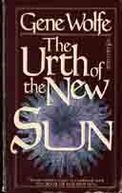
| Series: | New Sun #5 |
| Publisher: | Tor |
| Copyright: | November 1987 |
| Printing: | September 1988 |
| ISBN: | 0-812-55817-0 |
| Format: | Mass market |
| Pages: | 372 |
This is a wrap-up of the Book of the New Sun, written some time after the last book of the original four-book series. While the linkage is not as tight as between the first four books, you do not want to read it without having read the previous books.
The previous book, The Citadel of the Autarch, reached some closure on Severian's life but left quite a few questions unanswered. I was hoping this book would open up the cover a little and explain some of the details that had been going on under the main plot, not just continue it.
Alas, it doesn't.
The quirk of this series is that its main character and narrator is highly unreliable in his account of what's going on. The facts are mostly undistorted, but Severian's interpretation is often worthless. He tends towards mystical or fantastic explanations of straightforward events, mundane explanations of events that are actually quite unusual, and sometimes is simply quite dense. Most disconcertingly, he doesn't signal to the reader when something important has just happened, which may sound like a minor inconvenience but can make the details of the story quite difficult to follow.
The Book of the New Sun is a puzzle. I usually don't like working hard at understanding books, but there were enough puzzles in the first four books that were fairly easy to figure out. I enjoyed guessing at what bit of technology was at work when Severian treated something as magic or mystical and piecing together bits of history and culture from his descriptions. In The Urth of the New Sun, however, the story moves away from its grounding in human culture and city surroundings, the plot becomes far more mystical and complex, and the puzzles hard enough that I spent most of the book somewhat lost. Severian's lack of cues for the reader is workable when the basic plot is straightforward, but in Urth, I wanted more help from the narrator than Severian is able to offer.
By the middle of this book, I was having great difficulty figuring out what was really happening beyond the superficial level Severian explains. Many of the events in Urth seemed purely magical, explainable only by symbolism and God-like powers. The story wanders deeper into Severian's head and away from the grounding of events around him, and I ended up just slogging through the last section of the book, having lost interest in a world that no longer felt real.
It was a disappointing experience. While there were glimmers of the deep sense of age of the earlier books, and Urth adds some intriguing links and twists added back to the original plot (usually through time travel), this is not the book I was hoping for. It neither took a different look at the New Sun series to shed some light on what had been happening or kept the formula and feel of the original series intact. The mythical ending left me bored.
I don't think I would recommend this book even to someone who read the original series. Yes, there are some huge open plot questions left at the end of Citadel that are resolved here, but I often found my own ideas of what was likely to happen more interesting than what happened in Urth. The exception, though, is if you're going to go on to read an analysis of the series, such as Robert Borski's Solar Labyrinth, in which case you should definitely read Urth to get a complete picture.
Reviewed: 2004-09-10